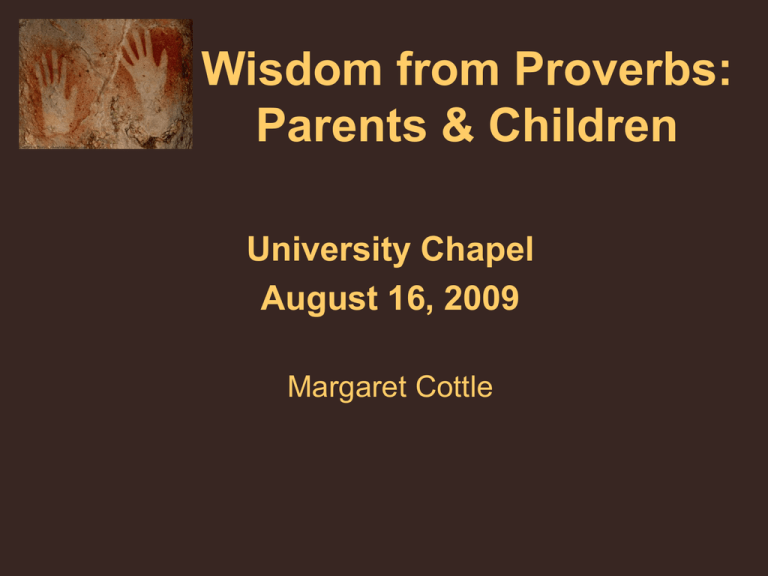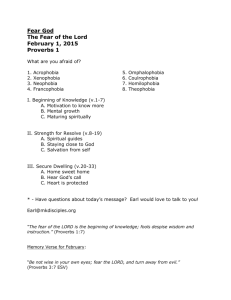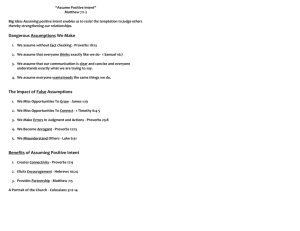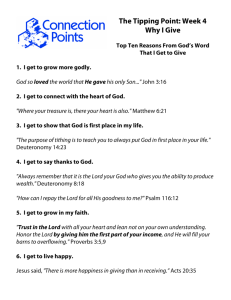Sermon Notes - University Chapel
advertisement

Wisdom from Proverbs: Parents & Children University Chapel August 16, 2009 Margaret Cottle Welcome to newcomers and visitors. Today there is a high probability that some of our guests will not have English as their first language, so I shall try to include the majority of my talk on the powerpoint slides. I hope you brought your lunch… Overview Main message of Proverbs: “Don’t be stupid!” Context framed as advice from father to son Not universal promises, but observations about how the world generally functions Proverbs so far… • • • • Wisdom and Folly contrasted Managing money Power of words Sexual purity Money: generosity vs greed A generous man will prosper; he who refreshes others will himself be refreshed. Proverbs 11:25 A greedy man brings trouble to his family, but he who hates bribes will live. Proverbs 15:27 Words: Reckless words pierce like a sword, but the tongue of the wise brings healing. Proverbs 12:18 My son, if your heart is wise, then my heart will be glad; my inmost being will rejoice when your lips speak what is right. Proverbs 23:15-16 Sexual purity Sexual choices have consequences: (including kids!) My son, pay attention to what I say; listen closely to my words. Do not let them out of your sight, keep them within your heart; for they are life to those who find them and health to a man’s whole body. Above all else, guard your heart, for it is the wellspring of life. Proverbs 4: 20-23 Still to come… • Proper attitudes • Care of the Land • Diligence in Work • All refined in the crucible of family life Parents & Children: Huge topic, involves everyone-we are all children, and we all participate in the lives of children and parents in our community. Time constraints prohibit a discussion including the pain of infertility, childlessness, single-parent challenges or divorce. Current cultural attitudes re parents and children: very polarized No Kids: 40 Good Reasons Not to Have Children by Corinne Maier, 2007 (Fr) 2009 (Eng) • French mother of 2 • • • • • • • • • • Reasons to avoid having kids: •You will lose touch with your friends •Your sex life will be over •Children cost a fortune •Child-rearing is endless drudgery •Vacations will be nightmares •You’ll lose your identity and become just “mom” or “dad” •Your children will become mindless drones of capitalism •The planet’s already overcrowded •Your children will inevitably disappoint you Corinne Maier cont’d • “the child is a vicious, innately cruel dwarf” – French novelist Michel Houellebecq • “we have to be selfish” • we should “demand paradise for ourselves” • Reason #25-- It takes real courage to keep saying, “Me first” • “selfishness can be good for society” Housebroken, Confessions of a Stay-at-Home Dad By David Eddie, 2000 • Canadian writer and journalist • “I am so much more living my own life than I would have been if I had prosecuted my desire not to have kids when I was 20.” (CBC radio) • I have a “fuller, richer life” now • Lose cabin pressure model • beware “cult of kids” (cf Perfect Madness by Judith Warner) Broadway & Hollywood… Kids! You can talk and talk till your face is blue! Kids! But they still just do what they want to do! Why can't they be like we were, Perfect in every way? What's the matter with kids today? From Bye, Bye Birdie (Also: irreverent spoof of this song on The Simpsons) Dear kindly Sergeant Krupke, You gotta understand, It's just our bringin' up-ke That gets us out of hand. Our mothers all are junkies, Our fathers all are drunks. Golly Moses, natcherly we're punks! Gee, Officer Krupke, we're very upset; We never had the love that ev'ry child oughta get. We ain't no delinquents, We're misunderstood. Deep down inside us there is good! From West Side Story Plant a carrot, Get a carrot, Not a Brussels sprout. That's why I love vegetables. You know what you're about! But if your issue Doesn't kiss you, Then I wish you luck. For once you've planted children, You're absolutely stuck! From The Fantasticks Parents were invented to make children happy by giving them something to ignore. Ogden Nash 1902-1971 The reason grandchildren and grandparents get along so well is that they have a common enemy. Sam Levenson 1911-1980 "If life is theater, then parenting is improv." Robert Brault, www.robertbrault.com (retired writer) By the time a man realizes that maybe his father was right, he usually has a son who thinks he's wrong. Charles Wadsworth University Chapel Survey • Respondents: – Cultural roots in at least 9 countries – All age groups – Both men and women • Note unity of themes • Many thanks to all who participated survey • Best thing your parents do or say? (teens) – “Spend time with you and give you really good advice even though we think they are clueless.” – “I love you.” survey • Best thing your parents do or say, or did in the past? (young adults) • “They make me their first priority (whenever I visit). They are also very affectionate with me by giving me hugs and kisses even now.” • “In the past, the BEST thing my dad said to me was ‘I’m learning too… I’m always open to listening. This is all new for me too.’” survey • Best thing your parents do or say, or did in the past? (young adults) • “They trust me and let me explore life even when they think I’m making a mistake.” • “They tell me they love me. Showed up for almost every single game/concert/competition when I was growing up. Included us in vacations/meals with other families.” survey • Best thing your parents do or say, or did in the past? (young adults) • “My parents were role models for me in being faithful to one another and being committed to providing for their children.” • “My mother has always been free in offering words of affirmation…that contributed to my confidence and self-esteem. My father always reminds me of God’s love for me. During my ‘rebellious teenage years’ that always kept me from crossing the ‘point of no return’ with my rebellion.” survey • Best thing your parents do or say, or did in the past? (older adults) • “They provided a happy childhood for me.” • “They treated me with respect, not belittling or dictating but discussing and explaining; communicated high expectations--assuming without discussion: integrity, high marks and going to university. Set a good example--curiosity and diligence” • “I always knew that I would be accountable for my actions; they paid attention to where I was and what I was doing; they made themselves available.” survey • Best thing your parents do or say, or did in the past? (older adults) • “I could always count on them to encourage me and to believe in me.” • “They trusted me fearlessly, and that made me want to be trustworthy.” • “They loved and guided me in Godly values, encouraged and supported me in every way they could.” survey • Best thing your kids do or say? (young adults) • “Smile at us and ask for cuddle time.” survey • Best thing your kids do or say? (older adults) • “Spontaneous expressions of gratitude and appreciation; lack of any recrimination. Exceeding my hopes or expectations for them in many ways.” • “They seem to enjoy life.” • “Generally speaking they are very appreciative and encouraging.” • “Give us unconditional love and forgiveness.” • “Care for us diligently and gently when we need care, often spontaneously before we ask for their help.” survey • What could parents do or say to promote closer family relationships? (teens) • “Talk to kids not necessarily as parents, but as friends, and give advice as parents.” • “They could make more of an effort to have family time.” • “Spend more time together.” survey • What could parents do or say to promote closer family relationships? (young adults) • “Parents could let their ‘guard’ down and tell us how they have failed in the past. This would allow less pressure to be the perfect children we think our parents may want us to be. ( My dad failed on his first day on the job. This enabled me not to be afraid of failing at work, rather to try again.)” • “Recognize and admit imperfection; not having all the answers but modeling trust in God and praying to Him.” survey • What could parents do or say to promote closer family relationships? (young adults) • “Ask their children what they think about important issues…rather than immediately saying “no,” ask the child for a rationale/reasons. Acknowledge mistakes and ask for forgiveness. Be the adults/power base in the family as opposed to the children.” • “Not forcing children to do things their way; let go of their past experiences” survey • What could parents do or say to promote closer family relationships? (young adults) • “Words of encouragement; discipline with love; provide strong guidelines/boundaries….I now wish she (mother) had a stronger stance in some areas instead of always giving in.” • “Take time for themselves to rest or do whatever they need to do instead of yelling or being angry/frustrated at their children because they (parents) are tired or annoyed.” survey • What could parents do or say to promote closer family relationships? (older adults) • “My granddaughter has taught me a lot about the joy of ‘being there’ 100%. She really likes it when I get right down on her eye-level and focus on her and so do I! She often says, ‘Sit, Grandpa! No hockey! No golf!’ …I think ‘no cell phone’ is important, too.” survey • What could parents do or say to promote closer family relationships? (older adults) • “Play with the kids, take them for outings.” • “Keep communications open.” • “Initiate more academic dialogue on a variety of social, personal and other issues. Make chores a matter of participation rather than allocation” survey • What could kids do or say to promote closer family relationships? (teens) • “Respect their parents.” • “I don’t know.” survey • What could kids do or say to promote closer family relationships? (young adults) • “Be honest with their parents…be vulnerable to share their fears with their parents.” • “Love, respect and honour their parents.” • “Tone of voice is important…disagreements/differences of opinion are OK but I don’t think children should talk condescendingly or sarcastically to their parents.” • “Initiate conversations and take some time with their parents.” • “Appreciate what their parents have done for them.” survey • What could kids do or say to promote closer family relationships? (older adults) • Participate in discussions and chores. • “Keep parents in the picture as to what they are doing--not easy when time schedules are frenetically busy.” • “Always tell the truth.” • “Remember that parents are constantly learning about being parents (no matter what age!) and be gracious as they try to work out how to be and what to do.” survey • Top Tips to both parents and kids (teens) “Respect each other and talk as though you have not seen each other in ages.” “Don’t fear the future too much but try to have balance and to live in the moment if you can.” “Get along!” survey • Top Tips to both parents and kids (young adults) • “Have open communication with each other, don’t be afraid to speak out.” • “Always refer to God’s word in all things where answers are not clear.” • “Admit faults and be graceful and show love and patience to one another.” survey • Top Tips to both parents and kids (young adults) • “Respect and be a good listener.” • “Be honest about failures and doubts and ask for forgiveness when needed.” • “Different stages in life call for different types of relationships.” • “Never hold back on saying, ‘I love you.’ Never.” survey • Top Tips to both parents and kids (older adults) • “Have an open, loving personal relationship with the Lord Jesus by the Spirit and through the Word.” • “Have fun together.” • “Never do anything you might regret; because you likely will, forever.” • “Do things out of love not obligation; and if the love is not there, think of all the reasons why is should or could be.” • “Be aware that parents and children perceive ten times as much as you thing they do.” • Spend time one on one; it is totally different and irreplaceable.” Themes from survey • Importance of: • “being there” – “90% of caring is just showing up.” – “Kids spell love T-I-M-E.” (so do parents) • Good communication and mutual respect must be nurtured; they provide the foundation for accountability Themes from Proverbs • Parent-child relationships take work – Very intentional – Note all the words like: • train, discipline, correction, instruction • NB cultural context of word “rod” – NOT condoning brutality! (cf shepherd’s rod) – Contrasted with concepts such as: • “a child left to himself disgraces his mother.” Pr 29:15 • Whoever avoids discipline “hates his son” Pr 13:24 • “Discipline your son, for in that there is hope; do not be a willing party to his death. “ Pr 19:18 Thomas Edison, inventor “Opportunity is missed by most people because it comes dressed in overalls and looks like work.” It is easier to build strong children than to repair broken men. Frederick Douglass 1818-1895 African-American born into slavery, escaped and became a leader in the abolition movement in the US Easy to be simplistic and legalistic-but care must be taken with proverbs such as 22:6 “Train a child in the way he should go, and when he is old he will not turn from it.” If perfect parents always resulted in perfect children, Adam and Eve would never have sinned. Frank Schaeffer’s life so far… More Themes: both from survey & Proverbs Godly children bring joy to their parents: “The father of a righteous man has great joy; he who has a wise son delights in him. May your father and mother be glad; may she who gave you birth rejoice!” Proverbs 23:24-25 More Themes: both from survey & Proverbs Godly parents build a legacy of blessing: “He who fears the LORD has a secure fortress, and for his children it will be a refuge.” Proverbs 14:26 ”The righteous man leads a blameless life; blessed are his children after him.” Proverbs 20:7 Humility is a good foundation-the root word “audire” gives us the words for both “listen” and “obey” Parents and children are both admonished to “pay attention!” (especially to the Lord!) A wise son heeds his father’s instruction, but a mocker does not listen to rebuke. Proverbs 13:1 A fool spurns his father’s discipline, but whoever heeds correction shows prudence. Proverbs 15:5 Listen, my son, and be wise, and keep your heart on the right path. Proverbs 23:19. Micah 6:8 He has showed you, O man, what is good. And what does the LORD require of you? To act justly and to love mercy and to walk humbly with your God. Both Old and New Testaments are very clear that all children are blessings and gifts from God. We shall all be held accountable for how we use our opportunities to make eternal contributions to the lives of children and parents. “We must be a people who stand ready to receive and care for any child, not just as if it were one of ours, but because in fact each is one of ours.” Stanley Hauerwas Caution: Beware the prevailing philosophy in the developed world that people are “pests.” Note: doom and gloom of 1960’s “population explosion” did not happen; many Western countries are now very concerned about declining populations. Parents and Children Very important to God one of Ten Commandments expanded on in Deuteronomy 6 --foundation for “wisdom” in Proverbs Ten Commandments Exodus 20:1-17; Deuteronomy 5:6-21 • • • • • No other gods No idols Do not misuse the Lord’s name Observe the Sabbath Honor your father & your mother • Do not murder • Do not commit adultery • Do not steal • Do not give false testimony • Do not covet Fifth Commandment sited by the Apostle Paul in the New Testament: Children, obey your parents in the Lord, for this is right. “Honor your father and mother”—which is the first commandment with a promise—“that it may go well with you and that you may enjoy long life on the earth.” Ephesians 6: 1-3 “Okay, we get the idea, but how do we put these principles into practice?” UC survey cont’d “My own dad was great about letting my sister and me know that we were loved and appreciated and in praising us for work well done, and I am very grateful for that. However, I am concerned that, now that we are parents, my generation has moved too much in this direction, such that our words of love and congratulation to our children have become less meaningful and perhaps have even led to overconfidence, pride and and exaggerated view of one's importance…. Any suggestions you can make along the lines of, ‘How to raise a child that has healthy self-esteem but is not overconfident, mouthy and wise in his own eyes’ would be welcome.” (Parent of a 4 year old) Deuteronomy 6: The ten commandments applied • • • • • • • 1-3: context of community 4-6: personal character & devotion 7-9: how to raise godly children 10-12: beware prosperity! 13-15: Don’t follow other gods 17-19: Keep the Lord’s commands 20-25: Remember! (includes Mosaic covenant) NB: universe is morally consequential! Note the strong emphasis on the everyday & the ordinary in Deuteronomy 6. Deuteronomy 6:1-3 community • Woven into the fabric of the church – (All help each other with “oxygen masks”) • “chosen” family • Practice hospitality – Nuanced discussions of complex issues – Adults who pay attention – Good demonstration of human nature • What is a Family by Edith Schaeffer Deuteronomy 6: 4-6 character • Jay Kessler--love each other! • Model growth, struggle and integrity – Be genuine--gift of true self • Know your Bible – Study to show yourself approved – Not tossed by every wind of doctrine • Pray • Forgive--no “buts”!! Deuteronomy 6: 7-9 Godly children • Hebrew poetry: Impress these commandments on your children when you: – Sit at home/walk along the road – Lie down/get up • • • • Tie them on your hands Bind them on your foreheads Write them on the doorframes of your houses Write them on your gates Sit at Home • Someone needs to be home-– this is between you, your spouse and the Lord – Avoid over-commitment for everyone • Minimize: TV; video games; internet junk • Enjoy: good meals (includes conversation), music, literature & art • Mutual courtesy & respect, even in anger – (Ephesians 4) • Remember hospitality Walk along the road • Analyze culture in the light of Scripture – No topic is out of bounds • Relate to the outside world with integrity • Model a life of service to others • Beatitudes as a foundation – Matthew 5 Alan & the “pumps” When you lie down and get up • Read aloud from Bible and good books – every good story is His story! – C.S. Lewis re. children’s imaginations • Review the day & pray • NB Biblical definition of beauty – 1 Peter 3 • Biblical definition of “success” – Philippians 2 Tie them on your hands • Work--duty yet fun when possible – Patricia Sprinkle: Do I Have To? • Reach out to others – treatment help for “affluenza” • Creativity-– Hidden Art by Edith Schaeffer If you want children to keep their feet on the ground, put some responsibility on their shoulders. Abigail Van Buren (“Dear Abby”; born 1918) Bind them on your foreheads • Garbage in = garbage out • Learn & teach critical thinking – “Why is there not enough food in Africa?” • No whining • Frankl When we are no longer able to change a situation we are challenged to change ourselves. Dr. Viktor E. Frankl The Last Freedom We who lived in concentration camps can Remember the men who walked through the huts comforting others, giving away their last piece of bread. They may have been few in number, but they offer sufficient proof that everything can be taken from a man but one thing: the last of the human freedoms -- to choose one's attitude in any given set of circumstances, to choose one's own way. Man's Search for Meaning John Patrick’s Nine Universal Questions • • • • • • • • • Where did I come from? Why am I here? Where am I going? How do I come to terms with death? How can I make sense of suffering? How can I possibly believe in justice? What can I know? What should I believe? What must I do? Doorframes and Gates: at home & in the marketplace Be flexible Take every opportunity to remind them of their godly heritage and responsibility for obedience. BUT: DO NOT NAG!!! Model dependence on the grace of God The Robin & Margaret Cottle “Two-Word” Philosophy of Parenting: Minimize guilt. You can only control your own choices, not your children’s thoughts or actions. My friend’s comment in answer to my desperate concern about being “spiritually mature” when my children were young… “Face it, Margaret, if you hadn’t had those children, you wouldn’t have been that spiritually mature when you were 65!” Rebecca Burke 1985 What would I do differently? • Take myself way less seriously • Be less punitive and more consequential in discipline • Emphasize Bible stories from an earlier age • More great meals together (cf Adolescent Health study in JAMA Sept 10, 1997) • Try to remember that the “good” can interfere with the “best” What would I do differently? Get a dog WAY SOONER! What would I do differently? • Ignore people who made light of how hard it was to live with “naturally schizophrenic” preschoolers. • Really ignore people who said, “If you think they’re hard now, just wait until they’re teenagers.” What I continue to do & would do again… • Study and teach the Bible • Realize that I cannot “have it all” • Choose to be contented – Edith Schaeffer--do not let what you cannot have ruin what you do have! – Accepted the ministry opportunities God sends • Choose to work hard at hospitality & building community – Especially reaching out to others when I am needy • Support medical student & residents – (Investing in the future) Heavenly Father’s love and care: faithfulness and lovingkindness grace and truth Christ’s example: Agape love Only possible for me through the empowering of the Holy Spirit Love does not delight in evil but rejoices with the truth. It always protects, always trusts, always hopes, always perseveres. Love never fails. 1 Corinthians 13: 6-8 Never give up! On the Sunday our family gathered to celebrate my father’s 85th birthday, he surprised and thrilled us by being baptized to demonstrate his new-found faith in Christ. “O Sacred Head Now Wounded” My email mmcottle@mac.com







